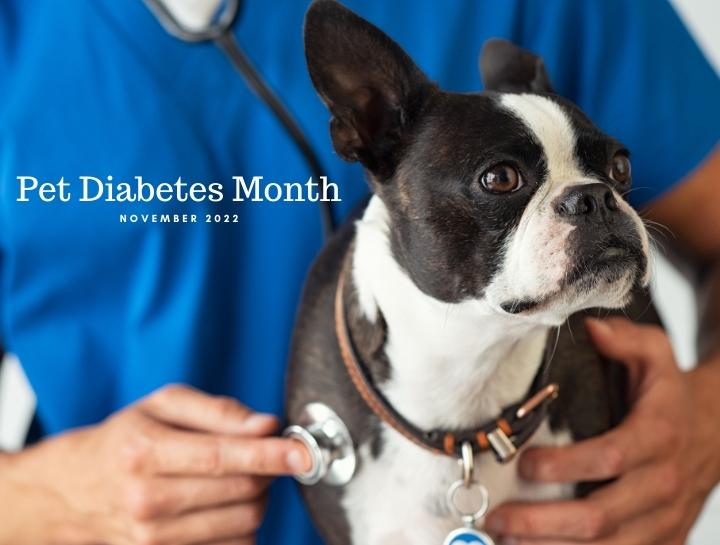Pet Diabetes Month

November is Pet Diabetes Month—the perfect time to discuss what it means to have a pet with diabetes and learn the early signs. Diabetes is estimated to affect between one in 200 cats and one in 300 dogs. Diabetes is one of the most common endocrine disorders in pets. With proper treatment and nutrition, your pet can have a long, happy life!
What is pet diabetes?
Pet diabetes, or diabetes mellitus, occurs when the body can’t effectively move glucose (sugar in the blood that comes from food) into cells, resulting in too much glucose in the blood and not enough in the cells. As a result, cells can’t function properly and the body has to get energy from other sources, including muscles and fat.
In a diabetic pet, insulin, a hormone that allows glucose to enter tissue cells, doesn’t bind properly with cell receptors or the pancreas doesn’t produce enough insulin. This is what causes glucose to build up in the bloodstream and is the reason why it is unable to be a source of energy for the body.
What are the early signs of diabetes?
The first step in getting proper treatment for your pet is proper diagnosis. Pet owners can look out for certain signs to know when to call their veterinarian for testing. Some signs include:
- Increased thirst
- Frequent urination
- Changes in appetite
- Weight loss
- Cloudy eyes (dogs)
- Weak hind legs (cats)
- Chronic infections
If your pet exhibits any of these signs, call us at (530) 272-6651.
What are the different types of diabetes that occur in pets?
There are two types of diabetes in pets. Type 1 diabetes is an insulin-dependent condition, typically requires lifelong therapy, and is most common in dogs. Type 2 diabetes requires insulin, but remission may be possible Type 2 diabetes is most common in cats.
What does life with a diabetic pet look like?
Diabetes can be a serious health condition that can lead to severe illness or death if left untreated. With proper management, your pet can still live a happy and active life. Management often includes at-home blood glucose monitoring, insulin, diet, and exercise.
If you think your pet is exhibiting signs of diabetes or have any questions about pet diabetes, call us at (530) 272-6651.
